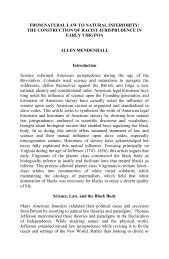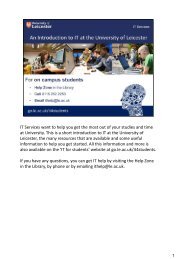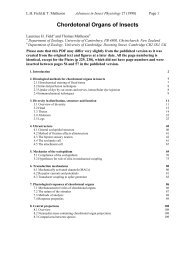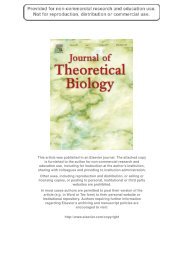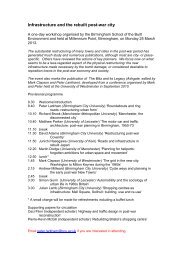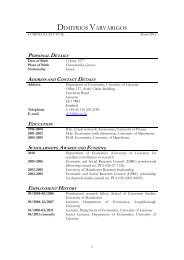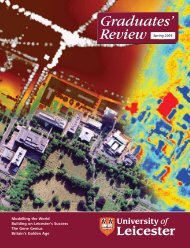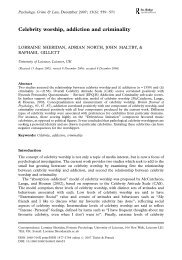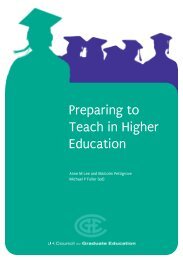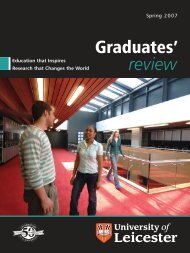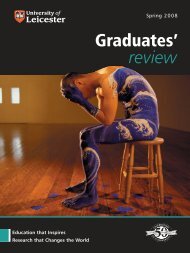Download a brochure - University of Leicester
Download a brochure - University of Leicester
Download a brochure - University of Leicester
Create successful ePaper yourself
Turn your PDF publications into a flip-book with our unique Google optimized e-Paper software.
<strong>Leicester</strong> Medical School<br />
UNDERGRADUATE COURSES IN<br />
Medicine MBChB<br />
www.le.ac.uk/sm/le
2 UNIVERSITY OF LEICESTER · LEICESTER MEDICAL SCHOOL<br />
Contents<br />
Medicine MBChB 3<br />
Why Study Medicine at <strong>Leicester</strong>? 5<br />
Course Structure 6<br />
Five Year Course 6<br />
Four Year Course 7<br />
Phases 8<br />
Phase I 8<br />
Phase II 10<br />
Your Learning Experience 12<br />
MBChB 5 Year Course 15<br />
MBChB 4 Year Course 16<br />
Student Life 18<br />
City 18<br />
Experiences at <strong>Leicester</strong> 19<br />
Welcome to <strong>Leicester</strong> Medical School<br />
We believe that our world-changing research produces high-quality<br />
teaching – and will inspire you to go further.<br />
At <strong>Leicester</strong> we are all about discovering ways to improve and change<br />
the world for the better.<br />
For example, our Department <strong>of</strong> Cardiovascular Sciences has developed<br />
an award-winning new technology that will revolutionise blood<br />
pressure measurement for the first time in over 100 years. Their<br />
pioneering new device, worn like a watch, takes blood pressure<br />
measurements close to the heart, making it accurate and comfortable<br />
for the patient.<br />
But this is not just about what we do – this is also about you.<br />
We know our work is better in a shared academic community that<br />
includes you. Where you are coming from and your journey up to this<br />
point will have given you your own personal perspectives and ideas.<br />
Your experience, energy and willingness to ask the difficult questions<br />
benefits you and us.<br />
At <strong>Leicester</strong> you will be working with our leading academics who are at<br />
the cutting edge <strong>of</strong> their disciplines, and with medical practitioners who<br />
are working at the sharp end <strong>of</strong> the National Health Service. By sharing<br />
their enthusiasm and learning from their expertise, you will be<br />
immersed in a stimulating and innovative environment, which will<br />
enable you to realise your potential and to embark on a successful<br />
career in medicine.<br />
We invented a completely new way to measure blood pressure.<br />
What will you discover?<br />
Get the full story at www.le.ac.uk/discover
UNDERGRADUATE COURSES IN MEDICINE MBCHB 3<br />
Contact Details<br />
<strong>Leicester</strong> Medical School<br />
<strong>University</strong> <strong>of</strong> <strong>Leicester</strong><br />
Medical School Office<br />
Maurice Shock Medical Sciences<br />
Building<br />
PO Box 138<br />
<strong>Leicester</strong><br />
LE1 9HN<br />
www.le.ac.uk/sm/le<br />
Medicine MBChB<br />
Our aim is to prepare new doctors to meet the challenges <strong>of</strong> health care in the 21st<br />
century. You will take forward knowledge, skills, attitudes and values that<br />
will prepare you for the inevitable changes in practice that will come in the future.<br />
We provide two routes to an MBChB: A well-established five-year curriculum for<br />
applicants with A-levels or equivalent, and a four-year accelerated curriculum for<br />
graduates with significant experience working in a caring role. The four-year<br />
curriculum for graduates is derived from the five-year course, and provides<br />
opportunities for careers in medicine to a whole new range <strong>of</strong> entrants.<br />
It <strong>of</strong>fers a rapid route to medical qualification, which recognises the knowledge and<br />
experience <strong>of</strong> entrants, but which also ensures a good understanding <strong>of</strong> human<br />
structure and function.
We’ve developed<br />
the sick bay<br />
<strong>of</strong> the future.<br />
Where will your<br />
enterprise take you?<br />
A cross-disciplinary team from the Departments <strong>of</strong> Medicine, Space Research<br />
(Physics) and Chemistry has combined their cutting-edge expertise to create a<br />
world-first, non-invasive disease detection facility.<br />
The Diagnostics Development Unit is designed to detect the “sight, smell and feel”<br />
<strong>of</strong> disease without the use <strong>of</strong> invasive probes, blood tests, or other time-consuming<br />
and uncomfortable procedures.<br />
The design <strong>of</strong> the Unit, which scans the patient with a selection <strong>of</strong> instruments<br />
while lying in a hospital bed, brings us one step closer to the sick bays <strong>of</strong> science<br />
fiction shows such as Star Trek.<br />
Discover more: www.le.ac.uk/discover
UNDERGRADUATE COURSES IN MEDICINE MBCHB 5<br />
Why Study Medicine at <strong>Leicester</strong>?<br />
• There has been a highly successful Medical School at the <strong>University</strong> <strong>of</strong> <strong>Leicester</strong><br />
for over 30 years and this experience means you will receive excellent teaching<br />
and support.<br />
• The five-year curriculum has been commended on several counts by the Education<br />
Committee <strong>of</strong> the General Medical Council in successive visits. In addition,<br />
<strong>Leicester</strong> Medical School was ranked 7th in the 2013 Guardian league table<br />
(our third consecutive top 10 finish), and 9th for student satisfaction in the<br />
2011 National Student Survey.<br />
• We <strong>of</strong>fer an unrivalled learning environment for you to develop the knowledge,<br />
skills and attitudes required to practise medicine in the new millennium. Our<br />
integrated approach means you will learn actively, develop practical clinical skills<br />
and meet patients during your first year.<br />
Aims and Outcomes<br />
Both five and four-year curricula<br />
provide you with the clinical<br />
competence to work as a<br />
Foundation Doctor, and the<br />
potential to develop along the<br />
curriculum <strong>of</strong> medical education<br />
into a humane and rational<br />
doctor. The General Medical<br />
Council has approved the curricula<br />
and graduation will make you<br />
eligible for provisional registration<br />
as a doctor.
6 UNIVERSITY OF LEICESTER · LEICESTER MEDICAL SCHOOL<br />
Course Structure<br />
The curricula are highly integrated, both ‘horizontally’, in that the disciplines within medicine are learned together, and<br />
‘vertically’, in that clinical work and clinical relevance are introduced from the very beginning.<br />
Five Year Course<br />
Phase 1 <strong>of</strong> five year course<br />
Phase 2 <strong>of</strong> five year course<br />
Semester 1 Semester 2 Semester 3 Semester 4 Semester 5 Junior Rotation Senior Rotation<br />
Molecules,<br />
Genes &<br />
Disease<br />
Tissues <strong>of</strong><br />
the body<br />
Metabolism<br />
Health &<br />
Disease in<br />
Populations<br />
Clinical<br />
Problem<br />
solving<br />
Musculoskeletal<br />
System<br />
Mechanisms<br />
<strong>of</strong><br />
Disease<br />
Cardiovascular<br />
System<br />
Membranes<br />
& Receptors<br />
Clinical<br />
Problem<br />
solving 2<br />
Infection &<br />
Immunity<br />
Urinary<br />
System<br />
Respiratory<br />
System<br />
Gastrointestinal<br />
System<br />
Health<br />
Psychology &<br />
Diversity<br />
Student<br />
Selected<br />
Component<br />
Reproductive<br />
System<br />
Head & Neck<br />
Health &<br />
Disease in<br />
Society<br />
Student<br />
Selected<br />
Component<br />
Nervous<br />
System<br />
Clinical<br />
Pharmacology<br />
Integrative<br />
Longitudinal<br />
Themes<br />
Basic Sciences<br />
Pathological<br />
Sciences<br />
Infection<br />
Imaging<br />
Pharmacology<br />
& Therapeutics<br />
Public Health<br />
Pr<strong>of</strong>essionalism<br />
Musculoskeletal<br />
care<br />
Peri-operative<br />
Care<br />
Cardio-respiratory<br />
Care<br />
Gastrointestinal<br />
Care<br />
Mental Health<br />
Care<br />
Student Selected Components<br />
Special Senses<br />
/SSC<br />
Cancer Care<br />
/SSC<br />
Acute Care<br />
Child Health<br />
Reproductive<br />
Health<br />
Student Selected Components<br />
Consultation Skills Foundation Course & People & Disease<br />
Team Working<br />
& IPE<br />
Clinical Methods<br />
Elderly &<br />
Chronic Care
UNDERGRADUATE COURSES IN MEDICINE MBCHB 7<br />
Four Year Course<br />
Phase 1 <strong>of</strong> four year course<br />
Phase 2 <strong>of</strong> four year course<br />
Semester 1 Semester 2 Semester 3 Junior Rotation Senior Rotation<br />
Molecules,<br />
Genes &<br />
Disease<br />
Tissues <strong>of</strong><br />
the body<br />
Musculo-skeletal<br />
System<br />
Mechanisms <strong>of</strong><br />
Disease<br />
Urinary<br />
System<br />
Infection &<br />
Immunity<br />
Longitudinal<br />
Themes<br />
Basic Sciences<br />
Pathological<br />
Sciences<br />
Infection<br />
Musculoskeletal<br />
care<br />
Peri-operative<br />
Care<br />
Special Senses<br />
/SSC<br />
Cancer Care<br />
/SSC<br />
Metabolism<br />
Gastrointestinal<br />
System<br />
Health &<br />
Disease in<br />
Populations<br />
Cardiovascular<br />
System<br />
Membranes<br />
& Receptors<br />
Reproductive<br />
System<br />
Respiratory<br />
System<br />
Clinical<br />
Pharmacology<br />
Head & Neck<br />
& Neurobiology<br />
Imaging<br />
Pharmacology<br />
& Therapeutics<br />
Public Health<br />
Pr<strong>of</strong>essionalism<br />
Cardio-respiratory<br />
Care<br />
Gastrointestinal<br />
Care<br />
Mental Health<br />
Care<br />
Student Selected Components<br />
Acute Care<br />
Child Health<br />
Reproductive<br />
Health<br />
Student Selected Components<br />
Patient-centred Clinical Practice<br />
Team Working<br />
& IPE<br />
Clinical Methods<br />
Elderly &<br />
Chronic Care<br />
Basic Science<br />
Clinical<br />
Student Selected<br />
Components
8 UNIVERSITY OF LEICESTER · LEICESTER MEDICAL SCHOOL<br />
“<br />
The teaching for my course<br />
is conducted by highly<br />
trained clinical doctors and<br />
scientists. ”<br />
Christian,<br />
MBChB Medicine<br />
Phases<br />
Both curricula are divided into two phases. Phase I will equip you with the knowledge<br />
and skills you need to pr<strong>of</strong>it immediately from full-time clinical education in Phase II.<br />
In the five-year programme, Phase I lasts five semesters; in the four-year programme<br />
it has been shortened to three semesters.<br />
Phase II is exactly the same for students on both programmes, who form a single cohort<br />
distributed over the full range <strong>of</strong> clinical attachments available to the Medical School.<br />
Phase I<br />
By the end <strong>of</strong> Phase I you will:<br />
• Be able to communicate with patients, examine them clinically and have a good<br />
understanding <strong>of</strong> the structure and function <strong>of</strong> the human body and how this<br />
relates to health and illness.<br />
• Appreciate the psychological and social context <strong>of</strong> health and illness.<br />
You will take a series <strong>of</strong> integrated, interdisciplinary modules related to human<br />
structure and function in health and disease. You will also undertake community<br />
attachments to illustrate the social and psychological context <strong>of</strong> medicine. Theoretical<br />
study <strong>of</strong> social and behavioural science supplements this learning in the community.
UNDERGRADUATE COURSES IN MEDICINE MBCHB 9<br />
Knowledge and Skills<br />
Understanding People<br />
Understanding Science<br />
The learning in Phase I provides you with<br />
essential knowledge and skills that will<br />
underpin your clinical practice<br />
throughout life.<br />
You will learn skills <strong>of</strong> pr<strong>of</strong>essional<br />
communication and physical<br />
examination by working first with<br />
‘simulated patients’ – actors trained to<br />
help you learn, and other volunteers.<br />
Very soon you will begin working on<br />
hospital wards with real patients.<br />
You must pass a formal clinical<br />
examination at the end <strong>of</strong> Phase I to<br />
demonstrate that you have the basic<br />
clinical skills necessary for Phase II.<br />
You will learn how the human body is<br />
put together, and how it works in health<br />
and illness, but you will also come to<br />
understand that patients are not just the<br />
illnesses they suffer from. They have<br />
social and psychological dimensions to<br />
their lives that affect how they become<br />
ill, how they react to illness, and the<br />
consequences <strong>of</strong> illness for them. ‘Social<br />
and Behavioural’ medicine, which helps<br />
you to understand the whole person<br />
and the context <strong>of</strong> health care, is a<br />
prominent feature <strong>of</strong> both Phase I<br />
curricula. You will work with patients in<br />
innovative community attachments to<br />
help you realise the importance <strong>of</strong> social<br />
and behavioural issues for yourselves.<br />
Doctors must be able critically to<br />
evaluate evidence. Students on the<br />
five-year programme take two ‘Student<br />
Selected Components’ in disciplines <strong>of</strong><br />
their choice, to develop skills <strong>of</strong> scientific<br />
understanding and evaluation. Some<br />
students may opt to use one <strong>of</strong> these<br />
slots to broaden their experience by<br />
studying a language or a subject in the<br />
Humanities.
10 UNIVERSITY OF LEICESTER · LEICESTER MEDICAL SCHOOL<br />
Phase II<br />
“<br />
The teaching for my course<br />
is very good, I really enjoy it.<br />
My lecturers have been<br />
helpful and extremely<br />
supportive, and the facilities<br />
in the medical department<br />
are exceptional. ”<br />
Siobhan Roche,<br />
MBChB Medicine<br />
Developing Your Clinical Skills<br />
We believe that the best way to learn medicine is to work with practising doctors. You<br />
will spend virtually all <strong>of</strong> your time in Phase II working full-time in clinical environments.<br />
Students on both the four and five-year curricula take a common Phase II. During a<br />
series <strong>of</strong> themed clinical blocks you will be expected to make the most <strong>of</strong><br />
opportunities for learning provided by the patients who come under the care <strong>of</strong> your<br />
clinical team.<br />
You will be given clear outcomes defining what you should be able to do by<br />
graduation. We will ensure that you get the right pattern <strong>of</strong> experience to develop<br />
these ‘competencies’ as effectively as possible.<br />
Organising Clinical Learning<br />
You will spend time in a series <strong>of</strong> themed placements designed to give you the<br />
optimum combination <strong>of</strong> broad experience and benefits <strong>of</strong> ‘apprenticeship’ – learning<br />
from the masters <strong>of</strong> the art <strong>of</strong> medicine.<br />
Learning in each block is by a series <strong>of</strong> structured activities guided by a workbook<br />
and led by experienced clinical teachers.
UNDERGRADUATE COURSES IN MEDICINE MBCHB 11<br />
The Clinical Learning<br />
Environment<br />
Student Selected<br />
Components<br />
Preparing you for Work<br />
as a Doctor<br />
We will maintain the smallest clinical<br />
teaching groups in the UK. The number<br />
<strong>of</strong> clinical placements have been<br />
expanded by major new developments<br />
at hospitals and community sites in<br />
<strong>Leicester</strong> and beyond. You must expect<br />
to spend up to half <strong>of</strong> your time on<br />
placements outside <strong>of</strong> <strong>Leicester</strong>.<br />
The range <strong>of</strong> patients and illness you will<br />
see accurately reflects the demands<br />
made upon doctors, giving you the best<br />
possible chance to prepare for the<br />
environment in which you will work<br />
once qualified.<br />
You will also spend time in innovative<br />
community attachments that allow you<br />
to explore the working <strong>of</strong><br />
multidisciplinary teams caring for a wide<br />
range <strong>of</strong> patients, and to see how care<br />
will develop in the future NHS.<br />
During Phase II there are four threeweek<br />
attachments where you may<br />
choose what to study, in order to<br />
pursue your interests and explore<br />
possible careers.<br />
Elective<br />
One block at the end <strong>of</strong> Phase II is also<br />
set aside for you to pursue an elective<br />
subject. You are expected to devise and<br />
undertake a project on a medical topic<br />
in a setting <strong>of</strong> your choice. The elective<br />
can be anywhere in the world and most<br />
students travel abroad. The elective is<br />
for a period <strong>of</strong> seven weeks.<br />
At the end <strong>of</strong> the programme you will<br />
spend time shadowing the job you will<br />
take during your Foundation<br />
Programme. This will ensure that the<br />
transition to the Foundation Programme<br />
is as smooth as possible.
12 UNIVERSITY OF LEICESTER · LEICESTER MEDICAL SCHOOL<br />
Library<br />
The <strong>University</strong> continually invests in its<br />
facilities to meet the needs <strong>of</strong> all<br />
students. In 2008 the <strong>University</strong><br />
opened the award-winning David<br />
Wilson Library – a stunning light, airy<br />
five-storey building providing state-<strong>of</strong>the-art<br />
facilities.<br />
Your Learning Experience<br />
Teaching Methods<br />
All learning takes place in an obvious<br />
clinical context so that you will see how<br />
it relates to your future practise as a<br />
doctor in Phase II. You will be placed in<br />
a variety <strong>of</strong> clinical environments across<br />
all the sites used by the Medical School,<br />
which range from Lincoln to<br />
Northampton.<br />
Both curricula also have a series <strong>of</strong><br />
integrated, interdisciplinary modules in<br />
Phase I to develop your knowledge <strong>of</strong><br />
medical science. Each module is<br />
delivered by an interdisciplinary team <strong>of</strong><br />
clinicians and scientists, and will<br />
emphasise continuously the application<br />
<strong>of</strong> knowledge to clinical practice.<br />
There are a few lectures, designed to set<br />
the scene and to give a broad<br />
framework. These are delivered in new<br />
high-technology lecture theatres with a<br />
full range <strong>of</strong> video and other facilities.<br />
Most <strong>of</strong> your learning, however, takes<br />
place in small groups. You will work on<br />
structured, clinically related problems.<br />
In Phase II learning takes place in the<br />
clinical environment, through seminars,<br />
clinical skills sessions and bedside<br />
teaching, all supported by structured<br />
work-books.<br />
Support and Facilities<br />
Tutorial support is provided face-to-face<br />
by experienced, principally medically<br />
qualified staff. There are good learning<br />
resources, with dedicated seminar<br />
rooms and IT facilities. The Medical<br />
Sciences Building at <strong>Leicester</strong> has a full<br />
range <strong>of</strong> facilities, including a large<br />
dissecting room. We have preserved the<br />
learning <strong>of</strong> anatomy by extensive study<br />
<strong>of</strong> cadavers.<br />
Self-service loan and return, group<br />
study rooms, hundreds <strong>of</strong> PCs,<br />
wireless access throughout, staffed<br />
Help Zones, 24-hour opening during<br />
term time, plus a rather nice<br />
bookshop and café, create a study<br />
environment second to none.<br />
There are also Information Librarians<br />
for each subject area, who can provide<br />
detailed advice for your discipline and<br />
help you make the most <strong>of</strong> the<br />
resources available in the Library and<br />
on the web.<br />
The <strong>University</strong> invests over £6m a year<br />
in the Library. There is access to more<br />
than a million printed volumes and a<br />
digital library <strong>of</strong> thousands <strong>of</strong> electronic<br />
journals and 350,000 books. The<br />
Library website gives you access to the<br />
online catalogue wherever you are. This<br />
includes the <strong>Leicester</strong> Research Archive,<br />
a digital collection <strong>of</strong> research papers<br />
and theses from members <strong>of</strong> the<br />
<strong>University</strong>.<br />
The Library: www.le.ac.uk/library
UNDERGRADUATE COURSES IN MEDICINE MBCHB 13<br />
Putting it All Together<br />
At the end <strong>of</strong> the day all parts <strong>of</strong> the<br />
curriculum must come together in your<br />
own mind, so you may focus them on<br />
clinical problems. Throughout Phase I all<br />
students on the five-year programme<br />
work on integrating their knowledge by<br />
means <strong>of</strong> the ‘People and Disease<br />
Module’. You will be guided in your<br />
work by a medically qualified mentor,<br />
and present your work as a thesis<br />
examined at the end <strong>of</strong> Phase I. The<br />
four- year programme has an innovative<br />
‘Patient Centred Practice’ course, which<br />
draws together a wide range <strong>of</strong> themes.<br />
Assessment<br />
Assessment is designed to ensure that<br />
you can monitor your progress towards<br />
the programme outcomes, and that<br />
both the Medical School and you can be<br />
certain that you are competent to begin<br />
a lifetime <strong>of</strong> medical practice.<br />
In Phase I each module has a formative<br />
assessment that gives you immediate<br />
feedback on your progress. You will be<br />
tested summatively on your knowledge<br />
and ability to link material across<br />
modules at the end <strong>of</strong> each semester. To<br />
progress to Phase II you must satisfy the<br />
examiners in the core assessments, and<br />
complete satisfactorily your Student<br />
Selected Components. A variety <strong>of</strong><br />
assessment techniques are used, but all emphasise the application <strong>of</strong> knowledge and<br />
skills to clinical problem solving and patient management.<br />
In Phase II you will receive continual feedback on your developing clinical skills and<br />
knowledge, block by block. Your skills will also be tested in two integrated<br />
examinations, one half way through Phase II, the other towards the end. Assessment<br />
is by direct observation <strong>of</strong> your clinical practice combined with written papers testing<br />
your clinical problem solving ability and knowledge.
14 UNIVERSITY OF LEICESTER · LEICESTER MEDICAL SCHOOL<br />
Entry Requirements<br />
We are seeking men and women from all backgrounds who<br />
will have a thoughtful, caring and compassionate approach to<br />
medical practice. Entry to the five and four-year programmes is<br />
extremely competitive. Gaining an interview depends upon<br />
your academic achievement and evidence <strong>of</strong> motivation for a<br />
career in medicine.<br />
In addition, you will be required to sit the UKCAT test, details<br />
<strong>of</strong> which can be found at www.ukcat.ac.uk. If selected you<br />
will participate in a structured selection process at the Medical<br />
School. This process will include an assessment <strong>of</strong> motivation,<br />
commitment, written communication, verbal communication<br />
and problem solving.<br />
Financial Support and Fees<br />
English domiciled graduate entrants to the four-year<br />
curriculum are eligible for Department <strong>of</strong> Health support in<br />
the form <strong>of</strong> fee payment and a means-tested bursary in<br />
years two, three and four. English domiciled entrants to the<br />
five-year curriculum are eligible for support in their fifth year<br />
<strong>of</strong> study.<br />
Further information on NHS Bursaries may be obtained at<br />
www.nhsbsa.nhs.uk/Students.aspx<br />
In addition, you may also find it helpful to look at the<br />
website <strong>of</strong> the Department <strong>of</strong> Business, Information and Skills<br />
which provides information on support for home students.<br />
www.bis.gov.uk/policies/highereducation/students/student-finance<br />
Information on fees can be found at www.le.ac.uk/fees
UNDERGRADUATE COURSES IN MEDICINE MBCHB 15<br />
MBChB 5 Year Course<br />
UCAS code: A100 MBChB<br />
We <strong>of</strong>fer 179 places each year for students, including 17 places for students from<br />
outside the European Union, for the five-year curriculum. All entrants are selected on the<br />
basis <strong>of</strong> academic performance and personal qualities assessed from the application form<br />
and at interview. We expect to see a good range <strong>of</strong> GCSE results, or equivalent, with<br />
high grades and a supportive reference from your school or college.<br />
Work experience in an appropriate environment (e.g. in a hospital, with a GP, in a<br />
residential home etc) is desirable but the difficulty in obtaining this type <strong>of</strong> work<br />
experience is acknowledged and other work experience involving working with<br />
people is acceptable.<br />
For school and college leavers we welcome the developments in breadth in the post-16<br />
curriculum but will expect very high grades at A-level. Normally four AS subjects,<br />
including Chemistry and Biology, but excluding General Studies, should be studied in year<br />
12. We will accept the Extended Project in place <strong>of</strong> one AS Level (excluding Chemistry<br />
and Biology). Three <strong>of</strong> the subjects, including Chemistry, but excluding General Studies<br />
should be continued to A2 level. The normal <strong>of</strong>fer is AAA.<br />
A number <strong>of</strong> equivalent qualifications are acceptable. Students on the final year <strong>of</strong> a<br />
degree course who have a background in biology and chemistry or graduates who have<br />
not worked in a caring role may apply for the five-year course.<br />
For further information on<br />
the five-year programme<br />
please contact:<br />
Dr Kevin West<br />
The Senior Tutor for Admissions<br />
<strong>University</strong> <strong>of</strong> <strong>Leicester</strong><br />
<strong>Leicester</strong> Medical School<br />
Maurice Shock Medical Sciences Building<br />
PO Box 138,<br />
<strong>University</strong> Road,<br />
<strong>Leicester</strong>,<br />
LE1 9HN<br />
T: 0116 252 2969<br />
0116 252 2985<br />
0116 252 2966<br />
E: med-admis@le.ac.uk<br />
W: www.le.ac.uk/sm/le
16 UNIVERSITY OF LEICESTER · LEICESTER MEDICAL SCHOOL<br />
For further information on<br />
the accelerated four-year<br />
programme please contact:<br />
Dr Margaret Barnes-Davies<br />
Graduate Admissions Tutor<br />
<strong>Leicester</strong> Medical School<br />
<strong>University</strong> <strong>of</strong> <strong>Leicester</strong><br />
Maurice Shock Medical Sciences Building<br />
PO Box 138,<br />
<strong>University</strong> Road,<br />
<strong>Leicester</strong>, LE1 9HN<br />
T: 0116 252 2969<br />
0116 252 2985<br />
0116 252 2966<br />
E: med-admis@le.ac.uk<br />
W: www.le.ac.uk/sm/le<br />
MBChB 4 Year Course<br />
UCAS code: A101 MBChB<br />
We <strong>of</strong>fer 64 places a year for graduates <strong>of</strong> any discipline, with significant experience<br />
<strong>of</strong> working in a caring role, for the four-year MBChB curriculum. We do not consider<br />
international students for this course. All entrants are selected on the basis <strong>of</strong><br />
academic performance and personal qualities judged from the application form and<br />
at a structured selection process at the Medical School. You will need to have a first<br />
class or good upper second class honours degree and several years <strong>of</strong> postgraduate<br />
work experience in a caring role.<br />
Applications from graduates <strong>of</strong> arts and humanities are encouraged.<br />
“<br />
As far as the General Medical Council is concerned the training <strong>of</strong><br />
students at <strong>Leicester</strong> is a splendid example <strong>of</strong> how we want young<br />
doctors to be equipped to handle society’s medical problems. ”<br />
Sir Donald Irvine, Past President <strong>of</strong> the General Medical Council
UNDERGRADUATE COURSES IN MEDICINE MBCHB 17<br />
Hepatitis B<br />
The School <strong>of</strong> Medicine is mindful <strong>of</strong> its overriding duty <strong>of</strong><br />
care to the public who medical students come into close<br />
contact with during their studies. Consequently, if your<br />
application is successful and you accept our <strong>of</strong>fer, you will be<br />
required to complete a confidential medical questionnaire<br />
and return it to our Occupational Health Service.<br />
On entry to medical school the Occupational Health Service<br />
will arrange checks for Hepatitis B and C, Tuberculosis,<br />
Rubella and Chicken Pox. They will provide, post registration,<br />
any necessary immunisations and any further specific health<br />
assessments or advice which may be required in relation to<br />
your medical training.<br />
If a student is found to be a carrier <strong>of</strong> Hepatitis B or other<br />
chronic virus infection you may be allowed to continue your<br />
course but not allowed to assist with or undertake surgery or<br />
other ‘exposure-prone’ procedures on patients. It will not<br />
prevent you from qualifying or practising as a doctor, except<br />
for the restriction on exposure-prone procedures.<br />
Fitness to Practise<br />
Admission to the Medical School is contingent on a<br />
satisfactory Criminal Record Check.<br />
Students who successfully complete the academic<br />
requirements <strong>of</strong> their medical course for the degrees <strong>of</strong><br />
MBChB will be awarded the degrees only if they are deemed<br />
by the Medical School to be fit to practise medicine.<br />
Students may be required to withdraw from the programme,<br />
or transfer to another degree programme at any time if the<br />
Fitness to Practise Committee decides that there is sufficient<br />
reason to judge that they are unfit to practise medicine<br />
because <strong>of</strong> health, conduct or other grounds.<br />
How to apply<br />
All applications must be made online through<br />
www.ucas.com<br />
The address for UCAS is:<br />
UCAS, Rosehill, New Barn Lane, Cheltenham, Glos,<br />
GL52 3LZ<br />
E: app.req@ucas.ac.uk
18 UNIVERSITY OF LEICESTER · LEICESTER MEDICAL SCHOOL<br />
Student Life<br />
Campus<br />
On our bustling compact campus it’s<br />
impossible to walk from one end to the<br />
other without bumping into someone<br />
you know along the way. The campus is<br />
a vibrant community, with all manner <strong>of</strong><br />
places to meet, eat and drink, as well as<br />
study. We’re committed to providing you<br />
with high quality facilities and our £1bn<br />
campus development plan ensures all<br />
our resources meet the needs <strong>of</strong> modern<br />
and ambitious students.<br />
Students’ Union<br />
The Students’ Union is brimming with<br />
opportunities that will make your time<br />
at <strong>Leicester</strong> unforgettable. The<br />
spectacular Percy Gee building boasts<br />
superb facilities, from bookshops to bars<br />
and the fantastic live music venue, O 2<br />
Academy <strong>Leicester</strong>. You are encouraged<br />
to get involved with the SU – there are<br />
over 200 student societies covering a<br />
huge range – sport, politics, media,<br />
performing arts and much, much more.<br />
It’s a great way <strong>of</strong> meeting new people,<br />
gaining skills or trying something<br />
completely different!<br />
Accommodation<br />
Our accommodation <strong>of</strong>fers you a wide<br />
variety <strong>of</strong> choice. Whether you fancy<br />
self-catered or catered, en-suite or<br />
standard, there will be a package to suit<br />
you. Our halls at Oadby are surrounded<br />
by beautiful Botanic Gardens and <strong>of</strong>fer a<br />
thriving social life. Accommodation in<br />
the city gives you independence and the<br />
amenities <strong>of</strong> <strong>Leicester</strong> right on your<br />
doorstep.<br />
You are guaranteed a room in halls if<br />
you apply for accommodation by 1<br />
September <strong>of</strong> your year <strong>of</strong> entry.<br />
www.le.ac.uk/accommodation<br />
City<br />
<strong>Leicester</strong> is a lively and diverse city and<br />
the tenth largest in Britain. It has all the<br />
activities and facilities you would<br />
expect, with a friendly and safe<br />
atmosphere. The city centre is just a<br />
short walk from campus so you’ll never<br />
be far from the action.<br />
<strong>Leicester</strong>’s diverse heritage is reflected in<br />
a dazzling array <strong>of</strong> festivals and cultural<br />
experiences including the largest Diwali<br />
celebrations outside India, the UK’s<br />
longest running Comedy Festival, the<br />
eclectic Summer Sundae Music Festival,<br />
and the <strong>University</strong>'s hugely successful<br />
book festival - Literary <strong>Leicester</strong>.<br />
Recent developments have led to the<br />
opening <strong>of</strong> the world-class Curve<br />
Theatre and Phoenix Square<br />
Independent Arts Centre in the new<br />
Cultural Quarter, which complement<br />
<strong>Leicester</strong>’s existing array <strong>of</strong> cinemas,<br />
theatres, museums and galleries.<br />
The sparkling Highcross complex<br />
features 110,000 square metres <strong>of</strong> retail<br />
therapy, bars, cafés and restaurants. For<br />
those with independent tastes <strong>Leicester</strong><br />
Lanes houses a variety <strong>of</strong> boutiques and<br />
specialist shops.<br />
As you would expect from a true<br />
student city, there is a huge range <strong>of</strong><br />
bars, clubs and live music venues that<br />
cater for all kinds <strong>of</strong> tastes. Food lovers<br />
are treated to a fantastic selection <strong>of</strong><br />
restaurants, with specialities available<br />
from every corner <strong>of</strong> the world.
UNDERGRADUATE COURSES IN MEDICINE MBCHB 19<br />
Experiences at <strong>Leicester</strong><br />
Javeria Peracha – 2010<br />
Having selected <strong>Leicester</strong>, based on its<br />
reputation as not only one <strong>of</strong> the best<br />
medical schools in the country but also<br />
one <strong>of</strong> the friendliest, I have to say that I<br />
wasn't at all disappointed! All <strong>of</strong> the<br />
Medical School staff and students were<br />
extremely welcoming and friendly. The<br />
'intro week' here is unique in that medics<br />
have their own 'pre-freshers week',<br />
where you get to meet and socialise with<br />
many <strong>of</strong> the people that you will be<br />
spending the next five years <strong>of</strong> your life<br />
with. Here at <strong>Leicester</strong>, each student is<br />
also assigned a 'personal tutor', who not<br />
only guides your personal and<br />
pr<strong>of</strong>essional development but will also be<br />
someone you will, no doubt, drop by to<br />
see every now and then.<br />
I loved the 'systems based' approach to<br />
the course structure in Phase 1, where we<br />
learnt the majority <strong>of</strong> basic clinical<br />
sciences according to body systems e.g.<br />
cardiovascular system, respiratory system<br />
etc. The mixture <strong>of</strong> teaching methods<br />
used, including lectures, small group work<br />
and practical sessions made sure our<br />
learning was always a dynamic and<br />
interactive process. Although the<br />
emphasis in Phase I was on the basic<br />
clinical sciences, by the time we were<br />
ready to move in to Phase II <strong>of</strong> the course,<br />
we had gained substantial competency<br />
and confidence in our clinical skills. This<br />
was made possible by patient contact<br />
right from the first few weeks <strong>of</strong> the<br />
course. In Phase II students undertake<br />
seven-week clinical attachments in the<br />
local hospitals. These attachments are<br />
extremely well organised.<br />
There is also an opportunity for students<br />
to undertake an intercalated BSc, where<br />
they can either study a taught course or<br />
undertake a year long research project. I<br />
have just finished my intercalated BSc,<br />
working in one <strong>of</strong> the <strong>University</strong><br />
laboratories. It was a great opportunity to<br />
gain a new skill set, but I also had the<br />
opportunity to represent the <strong>University</strong> at<br />
a number <strong>of</strong> national and international<br />
medical conferences and to win a number<br />
<strong>of</strong> competitive prizes.<br />
Socially, there are limitless opportunities to<br />
get involved in clubs and societies, both at<br />
the Medical School and at the <strong>University</strong><br />
Students’ Union. Having the Medical<br />
School situated next to the main<br />
<strong>University</strong> campus means that you are not<br />
limited to interacting with medics and can<br />
socialise with students from a very diverse<br />
range <strong>of</strong> courses.<br />
As a city, <strong>Leicester</strong> is pretty amazing! With<br />
two universities in the city, there’s a<br />
substantial student population and a<br />
buzzing nightlife. Compared to many<br />
other <strong>University</strong> towns it is also reasonably<br />
affordable and safe. I have found that no<br />
matter what your mood, <strong>Leicester</strong> will<br />
always have something to <strong>of</strong>fer. The<br />
population is so ethnically diverse in<br />
<strong>Leicester</strong>; there are numerous cultural<br />
opportunities to be had. From Diwali to<br />
Eid to the Chinese New year, you will be<br />
celebrating them all!<br />
I have had an amazing time here at<br />
<strong>Leicester</strong>. I have loved the course, the<br />
people, the opportunities and above all<br />
the experience.<br />
Good luck with your application and I<br />
hope to see you all in <strong>Leicester</strong> soon!
For further information please contact<br />
<strong>Leicester</strong> Medical School<br />
<strong>University</strong> <strong>of</strong> <strong>Leicester</strong><br />
Medical School Office<br />
Maurice Shock Medical Sciences Building<br />
PO Box 138<br />
<strong>Leicester</strong><br />
LE1 9HN<br />
www.le.ac.uk/sm/le<br />
This was printed by Print<br />
Services, <strong>University</strong> <strong>of</strong> <strong>Leicester</strong>,<br />
using vegetable based inks on<br />
FSC certified stock<br />
© <strong>University</strong> <strong>of</strong> <strong>Leicester</strong><br />
<strong>Leicester</strong> LE1 7RH<br />
UK<br />
www.le.ac.uk<br />
4518_05/12




